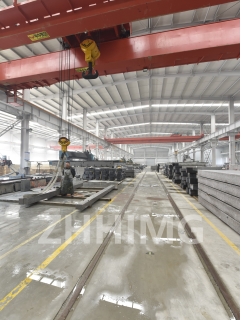Bridge CMM (Coordinate Measuring Machine) is a high-precision measurement tool that consists of a bridge-like structure that moves along three orthogonal axes to measure the dimensions of an object. To ensure accuracy in measurements, the material used to construct the CMM components plays a crucial role. One such material is granite. In this article, we will discuss the specific impact of granite components on the accuracy of the Bridge CMM.
Granite is a natural stone with unique characteristics that make it an ideal material for Bridge CMM components. It is dense, strong, and has excellent dimensional stability. These properties allow the components to resist vibrations, thermal variations, and other environmental disturbances that can affect the accuracy of measurements.
Several granite materials are used in the construction of the Bridge CMM, including black, pink, and gray granite. However, black granite is the most commonly used material due to its high-density and low thermal expansion coefficient.
The specific impact of granite components on the accuracy of the Bridge CMM can be summarized as follows:
1. Stability: Granite components provide excellent dimensional stability that ensures accurate and repeatable measurements. The stability of the material allows the CMM to maintain its position and orientation without shifting, regardless of environmental changes in temperature and vibration.
2. Stiffness: Granite is a stiff material that can withstand bending and twisting forces. The stiffness of the material eliminates deflection, which is the bending of the CMM components under load. This property ensures that the CMM bed remains parallel to the coordinate axes, providing accurate and consistent measurements.
3. Damping properties: Granite has excellent damping properties that reduce vibrations and dissipate energy. This property ensures that the CMM components absorb any vibration caused by the movement of the probes, resulting in precise and accurate measurements.
4. Low thermal expansion coefficient: Granite has a low thermal expansion coefficient compared to other materials such as aluminum and steel. This low coefficient ensures that the CMM remains dimensionally stable over a wide range of temperatures, providing consistent and accurate measurements.
5. Durability: Granite is a durable material that can withstand wear and tear from regular use. The durability of the material ensures that the CMM components can last for a long time, ensuring the reliability and accuracy of measurements.
In conclusion, the use of granite components in Bridge CMM has a significant impact on the accuracy of measurements. The material's stability, stiffness, damping properties, low thermal expansion coefficient, and durability ensure that the CMM can provide accurate and repeatable measurements over an extended period. Therefore, choosing a Bridge CMM with granite components is a wise investment for companies that require precise and accurate measurements in their production processes.
Post time: Apr-16-2024

